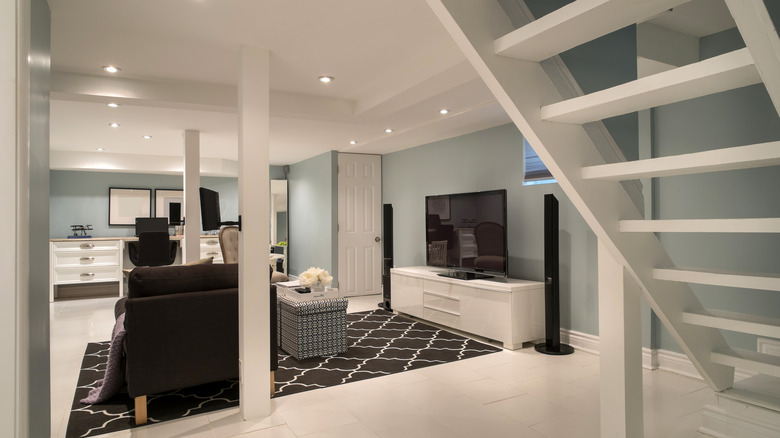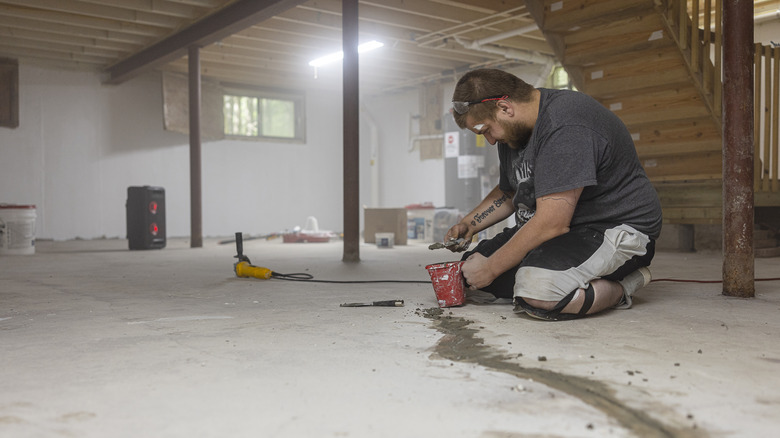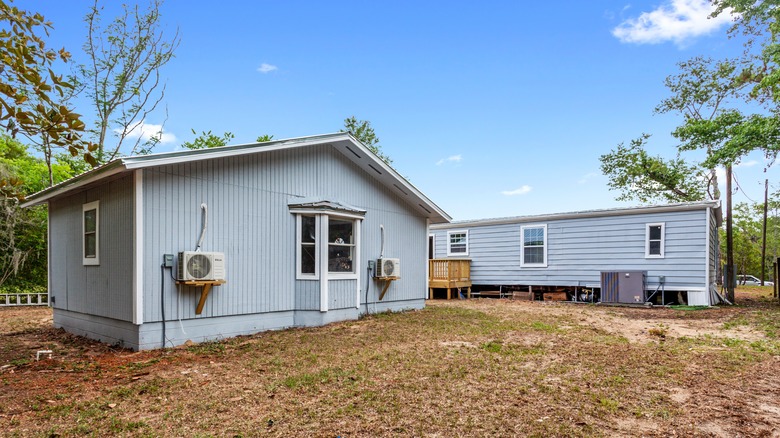TikTok Highlights Why A Basement Rental Could Be A Homeowner's Dream
For many, purchasing a home is a dream fulfilled, a major milestone passed, and a significant accomplishment attained. Unfortunately, in the current national housing market, owning a home can feel like less of an American dream and more like a pipe dream due to high home prices, less available inventory, and hefty interest rates. Not only does Forbes report that home prices are hitting all-time highs, but the business magazine also bears the bad news that the national average for a 30-year fixed mortgage rate is currently hovering around 7% and is expected to stay above 6.25% throughout 2024.
This isn't bad news if you've got a cool $442,500 lying around (the median sale price for house listings across the United States, per Realtor.com). But for most people, buying a home requires setting realistic expectations, being flexible on outcomes, smart investing, a whole lot of saving, and making some sacrifices to boot. If this is the boat you're in, turning your basement into a rental unit could be more than a liferaft — it can mean smooth sailing throughout your homeowner journey.
Landlord and TikTok creator @first_time_landlord explains in a video, "Why are owning basement rentals so amazing? Typically, it will cut your mortgage by at least half." Adding, "If you have the structure there, it shouldn't take much." Below, we break down this homeowner hack, share important things that are crucial to know for long-term landlord success, and explore alternatives in case a basement rental isn't feasible for you.
Is a basement rental unit a good idea?
Converting your basement into a legal apartment has the potential to slash your mortgage rate in half, but it's definitely not as simple as this TikToker makes it sound. As @first_time_landlord says, basement apartments need to have a separate entrance plus a kitchen, bathroom, and at least one bedroom. To figure out if it would be worth your while, you'll have to investigate whether basement dwelling units are legal in your local municipality, what you'll need to ensure your rental passes all local rules and regulations, how much it costs to get your rental up and running, and what your anticipated income will be.
A lot of this depends on where you live. For example, most homes in the southern United States (especially Florida, Louisiana, and parts of Texas), don't have basements due to the high water table, which makes them difficult to construct and prone to flooding. In these areas, a basement rental wouldn't be a financially savvy move, and you may consider an accessible dwelling unit instead. But, if you live in an area where basements are common and there is a good market for non-luxury rentals (such as a major college town), a basement-dwelling may be a good plan. Considering the current layout and condition of your basement along with construction costs, anticipated future income, and residential tenancy laws will play a large role in deciding whether this is a wise financial move.
Money-making alternatives to a basement apartment
Let's say you're in an area where basements are a legal or construction no-go, there's no way to move your basement entrance to separate it, or the costs associated with converting your unfinished basement don't make this a sound investment. Not to fret, there are still ways to make income with your property. First, if you have enough space on your land and your local laws permit, you can consider building a mother-in-law unit (accessible dwelling unit or ADU) and renting it out, or listing it on Airbnb. This could be a better long-term investment, as you won't have to deal with sharing walls and worrying about tiptoeing around your home so as not to disturb renters with noise.
Above-ground dwellings are also easier to heat in winter than basements, and less prone to flooding, dampness, mold, and pests. They also provide increased light from windows and the potential to provide your renter with outdoor space. This typically makes them more valuable and can mean more income to help you pay your mortgage. If you're not opposed to sharing space, you can also list a spare room in your home on Airbnb to help with the bills. Although Airbnb is a more hands-on endeavor, the return on investments is usually larger than long-term rentals. As a stress-relieving bonus — you won't have to deal with the hassle of leases and screening tenants, and Airbnb provides host liability insurance in case a guest damages your home.


